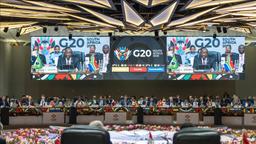Related Publication Files

Evaluation Note / Sumru Altug
The global financial crisis of 2007-2008 has been termed as the most synchronized recession since the Great Depression in the 1930’s. In its aftermath, we are observing a multitude of changes in the global economy and global governance. For one, the G-20 forum comprising industrialized and emerging economies has acquired added importance in promoting international cooperation as a way of dealing with the impact of the global financial crisis. The growing importance of the G-20 is arising from the strength of the emerging economies together with the disparate response of countries during the global recession. Specifically, we have observed short and sharp recessions for a group of prominent emerging economies such Brazil, Mexico, Russia, S. Korea, and Turkey whereas the G-7 countries have typically displayed U-shaped recessions, with countries such as the UK, the US, France and Japan experiencing large declines in output and a slow rebound. Furthermore, in countries such as Spain, Italy, Portugal, Hungary, and Greece suffering from asset price bubbles, large fiscal deficits and unsustainable levels of debt, output has been very slow to pick up (or, in the case of Greece, even shown persistent declines).




